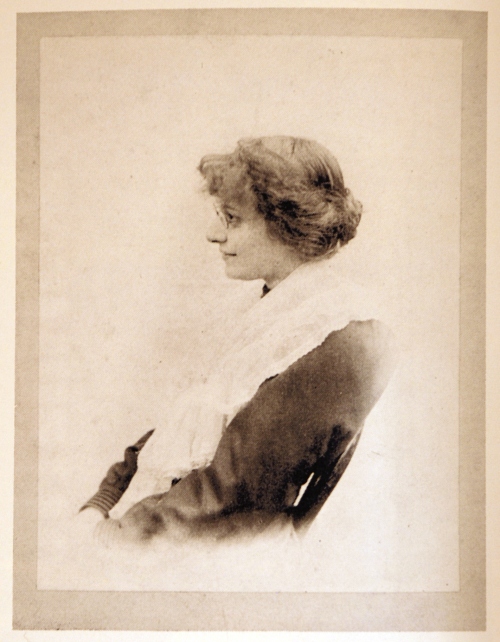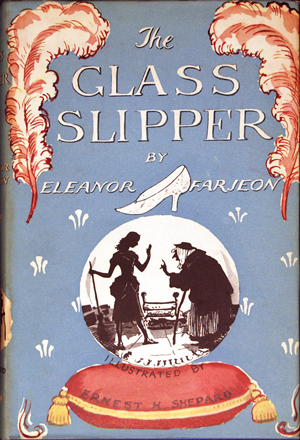‘Morning has broken, like the first morning
Blackbird has spoken, like the first bird
Praise for the singing, praise for the morning
Praise for them springing fresh from the word’.
Gallery visitors (and readers afar) might recognise the above as coming from the voice of 1970s English pop musician and folk singer Cat Stevens. Yet, some may be unfamiliar with the woman behind the lyrics: celebrated children’s author and poet Eleanor Farjeon (1881–1965).
Farjeon was a highly prolific writer who published over eighty books of stories, novels and poems for adults and children. She became friends with such literary lights as D. H. Lawrence, Robert Frost and Walter de la Mare. Farjeon developed a close friendship with the poet Edward Thomas, who was killed in the First World War in 1917, and she later published a memoir of their friendship called Edward Thomas: The Last Four years (1958; reprinted 1979).
Farjeon was also the recipient of three major literary awards: the Carnegie Medal of the British Library Association, the Hans Christian Andersen Award and the Regina Medal of the American Catholic Library Association. Created in 1966 the Eleanor Farjeon Award is given annually in her memory to someone who has made an outstanding contribution to children's literature.
 In late 1959 Eleanor Farjeon decided to make an important donation of books and manuscripts to the Dunedin Public Library. It is, therefore, with great pleasure that the Library is able to commemorate this act of generosity in the latest Reed Gallery exhibition ‘Morning Has Broken: The Farjeon Family Collection’. Why, however, did an English author donate material to a library on the other side of the world? The answer lies with Eleanor’s father and the great Victorian novelist Charles Dickens.
In late 1959 Eleanor Farjeon decided to make an important donation of books and manuscripts to the Dunedin Public Library. It is, therefore, with great pleasure that the Library is able to commemorate this act of generosity in the latest Reed Gallery exhibition ‘Morning Has Broken: The Farjeon Family Collection’. Why, however, did an English author donate material to a library on the other side of the world? The answer lies with Eleanor’s father and the great Victorian novelist Charles Dickens.
Eleanor’s father, Benjamin Farjeon (1838–1903), emigrated from England to Australia in 1854 and then New Zealand in 1861. He settled in Dunedin, New Zealand’s largest and wealthiest city at the time, and became manager and sub-editor of the fledgling Otago Daily Times newspaper.
 In the early 1860s Benjamin began writing plays and novels, including two of the earliest to be printed and published in New Zealand Shadows on the Snow: A Christmas Story (1865) and Grif: A Story of Australian Life (1866). He posted a copy of Shadows to his most admired author, Charles Dickens, in the hope that the story could be published in his periodical All the Year Round. Dickens replied on 29 May 1866.
In the early 1860s Benjamin began writing plays and novels, including two of the earliest to be printed and published in New Zealand Shadows on the Snow: A Christmas Story (1865) and Grif: A Story of Australian Life (1866). He posted a copy of Shadows to his most admired author, Charles Dickens, in the hope that the story could be published in his periodical All the Year Round. Dickens replied on 29 May 1866.
Though he did not accept the story for publication, the letter was enough to encourage Benjamin to leave a successful career in Dunedin and pursue the life of a writer. Farjeon returned to England in 1868 and, before his death in 1903, published a further sixty novels from his home in London.
It was the Dunedin connection that caused A. H. Reed to write to Eleanor Farjeon in 1926. Reed, an avid collector of autograph letters, hoped to secure Farjeon’s signature for inclusion in a copy of her book Trees (London, ca. 1914). Farjeon, in her reply letter of 13 April 1926, reminisced about her father’s ties to New Zealand, about which Farjeon wished she knew more, and offered to send some items of interest. More than thirty-three years would pass before their next communication.
In February 1959 Reed wrote to Eleanor expressing the interest in the material by a visiting scholar. He also took the opportunity to ask for a portrait of her father and for a facsimile of the Dickens letter (Reed was a keen collector of Dickensiana). This letter generated a lengthy correspondence between Reed and Farjeon. It was due to this friendship, and also in memory of her father no doubt, that Eleanor decided to donate more than 200 books, several boxes of manuscript material and related ephemera to the Dunedin Public Library.
She wrote in June 1959 that she had ‘been busy thinking about a suggestion I want to make, collecting material if you and Mr Lucas [the Town Clerk] approve’. In July, after a brief exchange of letters, Farjeon wrote to Reed that ‘This is only to tell you … that a first budget was posted to you last week – photographs, MSS., old letters … carefully annotated and docketed … but no late photograph of me – I am allergic to being photographed’.
Over the next few months Eleanor sent material related not only to her father and herself, but to her three brothers as well: Harry, Joseph Jefferson and Herbert.
 The eldest, Harry (1878–1948), was born in the United States and attended the Royal Academy of Music in London, later becoming its youngest professor at the age of twenty-five. He was a fine composer, writing mostly for piano; and he was also a music correspondent for the Musical Times and The Telegraph.
The eldest, Harry (1878–1948), was born in the United States and attended the Royal Academy of Music in London, later becoming its youngest professor at the age of twenty-five. He was a fine composer, writing mostly for piano; and he was also a music correspondent for the Musical Times and The Telegraph.
Joseph Jefferson (1883–1955) was a crime fiction novelist with more than eighty publications to his credit. His works were known for their wit, humour, and literary blend of mystery and romance, in such ‘pulp noir’ sounding titles as Death in the Inkwell (1942), Prelude to Crime (1948) and Cause Unknown (1950). A number of his plays were developed for the cinema, including ‘Number Seventeen’, which was adapted by Alfred Hitchcock in 1932.
The youngest of the Farjeon children, Herbert (1887–1945), was a major figure in the British theatre from 1910 until his death. Indeed he was involved in nearly every aspect of the stage from writing plays and theatre management to presenting revues in London’s West End. He was also a theatre critic for the Daily Mirror, the Listener (London), Radio Times and Vogue, as well as being a keen lyricist who wrote the delightful ‘I’ve danced with a man, who danced with a girl, who’s danced with the Prince of Wales’ in 1927.
Each member of this talented family is represented among the more than seventy-five items on display, the majority which have never been exhibited until now. The material includes a selection of published works (many with presentation inscriptions from one member of the Farjeon family to another), original manuscripts, ephemera, photographs, and personal correspondence.
The exhibition runs through to 23 October and is free and open to the public.
A PDF of the exhibition catalogue is available for download (1.4Mb in PDF format).
- Morning Has Broken: The Farjeon Family Collection
- 29 July 2011 to 23 October 2011
- Reed Gallery, Third Floor, City Library
- FREE
Related Video
Video coverage from the official opening of the exhibition.
